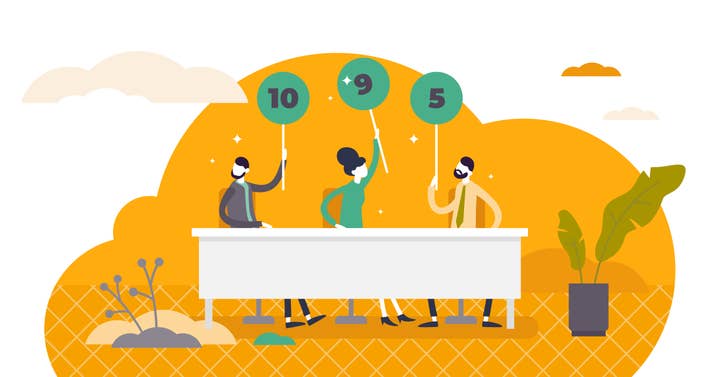Mock reviews and game evaluations play a crucial role in the development process. But what exactly are they, and how do they benefit developers?
Mock reviews are a common yet seldom discussed aspect of the games industry. This practice remains largely hidden due to the high confidentiality of the work involved, especially compared to other realms like QA and player testing. The enterprise operates under strict NDAs, rendering it a secretive facet of game development.
Utilizing insights from experts in publishing, PR, and game consultancy, as well as my experience as a freelance consultant and mock reviewer, this piece aims to shed light on the mock review process. Additionally, it will elaborate on how these evaluations serve as an essential checkpoint at various phases of game development.
What is a mock review?
A mock review closely imitates the reviews typically released by game journals. It's an in-depth critique highlighting a game's strengths and weaknesses, commissioned by publishers or marketing firms. These evaluations are usually authored by individuals with experience in games journalism.
Sterling McGarvey, head of consulting at Hit Detection, explains, "The idea is that publishers really want to gauge the potential success of their title and what a critical landscape will look like. Oftentimes, the goal is not to be broadsided by surprise reviews."
"Oftentimes, the goal is not to be broadsided by surprise reviews"Sterling McGarvey
Clients often request that mock reviewers provide not just a detailed critique but also a score, or an estimated ranking on Metacritic. Despite the increasing importance of community sentiment, McGarvey notes that "Metacritic is easier and neater for all parties involved."
Mock reviewers may be asked for a holistic view of the game, akin to an actual review, or to concentrate on specific areas such as potential sensitivity issues, the storyline, or game mechanics.
Rebecca Attard, head of global integrated communications at Splash Damage, states, "We pull together key messaging points when we're starting a campaign… and a lot of this is [about] how these key messaging points are coming across. If something we really want to lead on is gunplay mechanics, we will focus a lot more on 'How do you find the gunplay mechanics, and what kind of things would you recommend in terms of players creating their build-outs?'."
- Mock reviews, game evaluations, and their timing in development
While 'mock review' and 'game evaluation' are often used interchangeably, they refer to slightly different types of feedback. Mock reviews typically involve a written review and a score.
Natalie Flores, a PR consultant at Future Friends Games, mentions, "I have done only one pure mock review thus far in my career as a consultant. I've mostly done large reports spanning over 30 pages, amassed over the course of multiple surveys, roundtables, and many hours of writing; mock reviews have been a very small part of them."
These extensive reports, which include mock reviews as one component, are usually deemed evaluations. They can contain diverse feedback elements like breakout paragraphs or survey outcomes. The key difference between mock reviews and game evaluations lies in their timing within the development cycle.
McGarvey clarifies, "The term mock review is used as a blanket term. I look at a mock review as something that comes late in the development process, where perhaps there's not necessarily room to make changes. In contrast, a game evaluation can occur at any stage of the development process. [Hit Detection] can evaluate a game as early as its concept phase and provide feedback based on the collective expertise of the team."
"A lot of this is [about] how these key messaging points are coming across"Rebecca Attard
McGarvey adds that evaluations may involve looking at early, barely playable versions of games along with design documents to assess the game's vision. "If they can hit these elements of their vision, this is where we see them potentially landing."
Though it might appear counterproductive to commission a mock review close to release, such reviews still serve crucial roles. According to Lewis Denby, founder and managing director of indie marketing agency Game If You Are, "There's two things that we're trying to do here: manage the messaging, [and] make sure that we know what to lean into, what to lean away from. Also, you can use them to manage client expectations."
Mock reviews, therefore, offer valuable foresight into what critics may say upon the game's release. They enable last-minute changes in marketing strategies and help publishers and PR agencies adjust their internal expectations.
These reviews can be conducted internally by a publisher's communications department or a dedicated in-house evaluation team. However, they often seek consultancies or freelance consultants for an outsider's perspective.
- A practice not limited to large publishers
All types of clients, regardless of their size, commission mock reviews and game evaluations. McGarvey points out that although Hit Detection initially focused on "heavily AAA" titles, the consultancy now engages in various niches, including smaller budget AA titles and indie games.
"There's two things that we're trying to do: manage the messaging, [and] make sure that we know what to lean into, what to lean away from"Lewis Denby
For smaller studios, obtaining feedback is about spending their limited budget on the most impactful avenues to guide them toward success, Denby remarks.

Instead of allocating a large budget for an extensive report, it may be more practical to have evaluators provide feedback based on initial impressions. This could be achieved by supplying them with a trailer, media pack, screenshots, and a short demo playtime of 30 minutes.
"This can be incredibly educational for indie developers, as they are often too close to the project to notice issues such as an immediate difficulty spike within the first few minutes of gameplay," explains Denby. "Additionally, there might be aspects related to the game's presentation that are discouraging players from even trying the demo. Small studios and solo developers frequently struggle with this initial engagement, which is crucial."

Why are mock reviews and game evaluations beneficial?
Publishers typically employ mock reviews to predict a game’s reception before its release, while evaluations identify issues needing resolution. Developers, deeply involved with their projects, might struggle to evaluate their own work impartially. Mock reviews and evaluations can offer more objective feedback.
"When you're immersed in development every day, it's challenging to see the big picture," says Denby. "Indie developers often tell us they're confident in their game's reception based on show feedback. However, face-to-face feedback tends to be polite. Truly useful feedback comes from independent sources who don’t fear hurting your feelings."

Attard notes that evaluators also offer advice on presenting games to the media. Splash Damage provides mock reviewers with the same materials given to critics, enabling them to pinpoint where journalists and influencers might become confused. "We engage mock reviewers early on, especially when organizing significant events, to ensure the game's presentation is clear based on what they are playing and our messaging," she says.
Developers may recognize their games' issues but need substantiated evidence to advocate for changes. Game evaluations can support internal negotiations.
"Developers sometimes need to persuade higher-ups for additional resources, like budget for crucial features," Flores explains. "Consulting mock reviewers can validate their viewpoints, providing stronger arguments when requesting necessary adjustments."
- Distinguishing feedback from QA and playtests
Game feedback originates from multiple sources, including QA, consumer playtests, and influencer assessments. Each offers valuable insights, yet game evaluators bring a unique perspective.
"Game evaluators offer expertise that comprehends both media and community," says McGarvey. "Their experience in reviewing games provides intangible insights derived from practical involvement."

While QA testers focus on finding bugs and technical flaws, mock reviewers analyze the game critically.
"Our goal in a mock review is to anticipate the media's reaction," Denby notes. "We assess the emotions or thoughts the game might evoke and its potential media coverage. These insights are crucial."
According to Attard, mock reviewers can review games more dispassionately than playtesters.
"Consumers can get fixated on minor things they dislike. Mock reviewers provide a comprehensive overview and a considered analysis, often compiled into a detailed report rather than raw feedback."
- The significance of diverse reviewers
Publishers frequently commission multiple mock reviews from diverse critics. Multiple rounds of evaluations can occur at various development stages.
"Keeping a varied list of mock reviewers is wise to obtain different perspectives"Rebecca Attard
This approach ensures a wide range of insights. Attard mentions a strategy game might need a veteran strategy gamer and a generalist reviewer for contrasting views. Splash Damage typically includes both native and non-native English speakers to gain international perspectives.
"We usually conduct at least four mock reviews from different regions and journalists to avoid a singular perspective."
"It's beneficial to refresh your list of mock reviewers to introduce new viewpoints," she continues. "Generational differences also matter – younger reviewers might offer fresh perspectives compared to older ones."
How to pursue a career as a mock reviewer or game evaluator?
Many mock reviewers transition from games journalism after gaining extensive experience in review writing. Building a portfolio that demonstrates the ability to critically assess games and articulate those evaluations clearly is the initial step toward becoming a game evaluator.
"I advise honing your critique skills," mentions Flores. "Note down your thoughts post-gameplay, and construct coherent arguments from your perspective. Verbal articulation is crucial as well since you'll engage in extensive discussions and respond to developer inquiries during comprehensive mock review tasks."
"Networking is, at its core, authentic relationship building, so don't exclude yourself if it's an area you're improving on"Natalie Flores
Starting a blog to write reviews helps refine your abilities and shows your passion for games journalism. However, Denby points out that professional experience is often necessary before tackling mock review assignments.
"We need evidence that you’ve undergone the process – working with an editor, producing professionally published content – so we can be sure you're capable of creating the type of content we're looking to understand."
Beyond professional reviewing, understanding game development mechanics is beneficial. Being able to see beyond bugs to grasp the developer's intent is crucial. Additionally, when assessing a game later in its development, feedback should be realistic given the remaining development time.
- Be a versatile expert
Although it might seem contradictory, mock reviewers need both a broad understanding of the gaming industry and specialized knowledge. General familiarity with gaming news, industry trends, and community insights aids in providing valuable feedback, identifying potential marketing opportunities or risks. Versatility allows involvement in a variety of projects. However, having expertise in specific areas is also advantageous. When reviewing games within a genre you're familiar with, comparing them to similar titles can provide clients with valuable context.

If you excel at analyzing specific design aspects like UI/UX, you can carve out a niche for yourself. Publishers may seek your insights if you have a reputation in a particular genre or aspect of game design.
"If you have a niche that's beyond the typical 'this game is good or bad,' make it your standout skill," advises McGarvey.
Some reviewers focus on areas such as accessibility or diversity and inclusion.
"Accessibility is a field where many are doing outstanding advocacy and consultancy," adds McGarvey. "Their efforts benefit everyone… A rising tide lifts all boats, and these advances, in my view, enhance games overall."
- Market yourself and build connections
Securing mock review assignments involves visibility and building a reputation for quality reviews. Leveraging social media platforms where you have a presence can help showcase your work. A dedicated portfolio website enables publishers to review your past work and determine if you're a good match for their projects.
"Separating 'what do I think about this game' from 'what will people think about this game' is crucial"Sterling McGarvey
PR firms and consultancies frequently contact reviewers for mock reviews. Being proactive by emailing agencies about your availability can also lead to opportunities. Over time, word-of-mouth and networking can bring more work your way.
"Networking is fundamentally about forming genuine relationships, so don't discount yourself if you're still developing this skill," says Flores. "Be courteous and sincere; voice your opinions constructively on social media… and establish a reputation for reliability and quality work."
- Qualities of a good mock reviewer
A proficient evaluator offers insightful feedback on early game builds, undistracted by bugs likely to be resolved later. Feedback on aspects like the game's flow or difficulty is valuable to developers, whereas extensively detailing bugs is not.
Being able to detach personal preferences to present a broad view of the critical landscape is also valuable. McGarvey refers to this as the ability to externalize.

"Separating 'my thoughts on this game' from 'public perception of this game' is a crucial skill," he adds.
Denby highlights that reviewers should write as they would for a publication, rather than anticipating developers' expectations: "Review it as if you're publishing it, as that is what we aim to gauge when distributing this code – the potential reaction."
Lastly, Attard emphasizes the importance of clear communication and establishing positive relationships with publishers.
"Some reviewers provide feedback that isn't always positive, and publishers need to accept it without frustration or annoyance," says Attard. "Building good relationships where open communication about the process and reasons behind feedback is key."